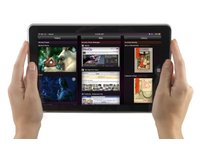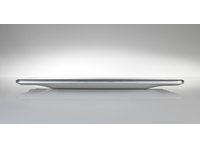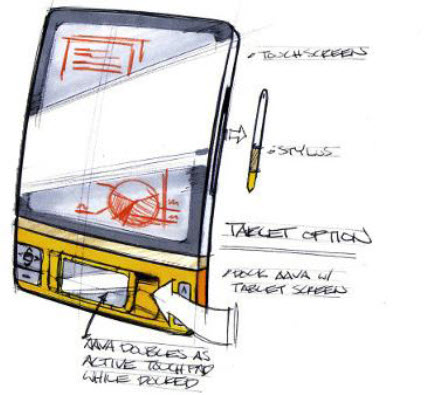Tom's Talks Moorestown With The Father Of Centrino
With its new Atom platform, Moorestown, Intel has made a lot of exciting claims and hinted at significant changes in our computing future. All good stuff, but we need more answers. To find them, we sat down with Intel’s godfather of ultra-mobility.
The Phone As A PC
TH: As someone who recently moved from BlackBerry to Android, I see handsets starting to become more reliant on cloud-based services rather than having to rely so much on local processing and storage. If that becomes a trend, would we even need ultraportables that create? Couldn’t all that work be done and stored in the cloud?
TT: The cloud is important, but we think we can do a lot more on even a handheld device than is possible in the cloud. Because you don’t want to always be dependant on the cloud, right? Maybe connectivity’s not available or, if you’re traveling abroad, for example, that connectivity may be very expensive. Our view is that you want to do as much as possible on the handset and then use the cloud. Connectivity is going to be king for this class of mobile devices, but you don’t want to depend on it to do your work.
TH: The general trend for Intel and the CPU industry as a whole has been to innovate, release those innovations at the top end of the product stack, then adapt those innovations as they trickle down into lower segments. But with Moorestown, we’re seeing a reversal. Here, the innovation is starting at the bottom, in cheap, lowly handsets, and will gradually move up, as we just saw with the Oak Trail announcement for tablets and smartbooks. What does this say about computing trends and Intel’s future in chip design?
TT: That’s a very good observation. We think some of the technologies from what we’re doing will trickle up. A lot of the technologies that we build here have a lot of applications in other areas, including our future desktop and server chips. Moorestown is designed for smart phones, but it scales to tablets because of the performance/power efficiency that we get from the architecture.


I think there are two pieces to it. Some of the technologies I was referring to will filter into our core direction. But the second thing is that some of these things will scale up into different power envelopes. Tablets are a clear example. We’ve shown the 1.5 GHz chip in a phone, but a 1.9 GHz device goes into a tablet because we can take advantage of the increased thermal envelope of tablet-class devices and run higher performance parts in there.
Get Tom's Hardware's best news and in-depth reviews, straight to your inbox.
-
whitecrowro "Why are we all here today? What is the meaning of Moorestown?Reply
Ticky Thakkar: Our vision was to.."
- pardon me, but all this naming sound like a Star Trek interview, on Tau Cygna (M class planet in Orion Nebula). -
cmcghee358 It would be nice to see Intel take a jab at discrete desktop graphics. If anything just to provide more competition for the consumer.Reply -
liquidsnake718 It would be nice to see that Zune HD ver 2.0 or even 3.0 with an updated Moorestown and a better Nvidia chip than the ion or ion2, with capabilities of at least 2.0ghz and 2gb of ram all the size of the zune.... imagine with 48hours on music, and 5 hours of video, this will only get larger as time goes by.... hopefully in a year or a year and a half we can see some TRUE iphone competition now with the new windows mobile out! We just need more appsReply -
Onus It never occurred to me to want an iPhone, but I definitely see one of these in my future.Reply -
matt314 cmcghee358It would be nice to see Intel take a jab at discrete desktop graphics. If anything just to provide more competition for the consumer....discrete desktop graphics is a pretty niche market. Without any experience in the field or specialized engineers, it would cost them alot of money in R&D, and they would not be able to beat ATI or nVidia (neither in performance nor sales)Reply -
cknobman Maybe its just me but I read the entire thing and Mr. Shreekant (Ticky) Thakkar came off as a arrogant ********.Reply -
Onus cknobmanMaybe its just me but I read the entire thing and Mr. Shreekant (Ticky) Thakkar came off as a arrogant dickhead.Merely disagreeing with you doesn't merit a "thumbs-down," but I didn't get that impression. Confidence, maybe; his experience no doubt backs that up, but I didn't find him arrogant. I liked how he called BS on the FUD.Reply
-
zodiacfml I read his comments carefully and found that those were carefully chosen words. Confidence is very much needed to get the support everyone while remaining factual.Reply
In summary, I expect their device to be better performing than anything else in the future at the expense of a huge and heavy battery to power the Atom and the Huge screen making use of excess performance.
cknobmanMaybe its just me but I read the entire thing and Mr. Shreekant (Ticky) Thakkar came off as a arrogant dickhead. -
cjl zodiacfmlI read his comments carefully and found that those were carefully chosen words. Confidence is very much needed to get the support everyone while remaining factual.In summary, I expect their device to be better performing than anything else in the future at the expense of a huge and heavy battery to power the Atom and the Huge screen making use of excess performance.Did you read the article? One of the points raised was that the battery life should be just fine, contrary to many people's assumptions.Reply -
eyemaster He knows his product, the targets to meet and what they have accomplished. I'm sure they experimented on competing devices too. The man knows that they have a great product in their hands right now that beats all the others. That makes him confident, not arrogant.Reply
